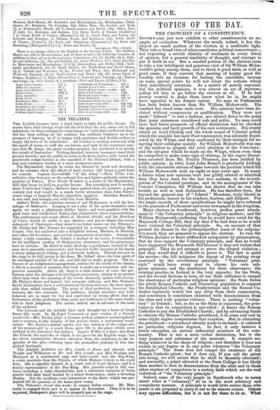THE THEATRES.
THE English theatres have a hard battle to fight for public favour. No sooner have their foreign rivals left the field than the sun comes out in full splendour; its blaze causing the stage-lamps to " pale their ineffectual fires." Sol has been sulking all the summer, but suddenly brightens up at the prospect of harvest, as if in league with sportsmen and health-seekers to empty the town of its inhabitants. All London is rushing eoastward with the speed of steam, to sniff the sea-breeze, and bask in the autumnal sum- mer, that M. Arago, the great weather-prophet, has predicted is to glorify the month of September. Nothing daunted, however, managers stand their ground bravely; and the public in town, to do them justice, rally round the patchwork ensign hoisted as the standard of the National Drama, with a zeal and constancy worthy of a more prosperous cause.
The Haymarket, though its ranks are thinned by death and desertion, and its veterans show the effects of hard service, still keeps a good front for comedy. Captain Tarradiddle " of the Army "—Beau Tibbs h-la- militaire--has been put on the reduced list, and figures gallantly under the auspices of Farren. Time Works Wonders is a motto of the Haymarket- bills that keeps its hold on popular favour. But something new is needed, since Vestris and Charles Mathews have quitted their old quarters: a good comedy just now would be a much better attraction than John Parry's comic songs or Leopold Meyer's pianoforte jugglery. Sheridan Knowles, it was said, had brought one with him from Madeira.
Sadler's Wells, the suburban retreat of sad Melpomene, is still the her- mitage of Shakspere. Longing to see a play of the great dramatist once again, we made a pilgrimage thither lately; and were gratified with the good taste and intellectual feeling that characterize these representations. The performance and scenic effects of Macbeth, Othello, and the Merchant of Venice, would do credit to any theatre; and put to shame the recent rehearsals of Shakepere—they deserve no better name—at the Princess's. Mr. Phelps and Mrs. Warner are supported by a company including Miss Cooper, who has mellowed into a delightful actress, Marston, G. Bennett, and other old favourites, and several young actors of promise. Among the latter, a light comedian, Mr. Scharf, a brother of the artist, is remarkable for his intelligent reading of Shaksperian characters, and his picturesque taste in costume. He dared to make Roderigo a gentleman, instead of the zany he is generally represented; and Lancelot Gobbo becomes in his hands a merry pragmatical witling, not a clownish buffoon. Though too new to the stage to do full justice to his ideas, Mr. Scharf shows the true spirit of an intelligent student of his art, and bids fair to make progress. The in- fluence of an enlightened management, zealous for the credit of the drama, is felt in a number of minutia' that tend to make up a consistent and im- pressive ensemble. Above all, there is a total absence of rant: the per- formers utter the dialogue with intelligent earnestness, aiming at no greater effect than what the meaning of the words discreetly spoken will convey. Mr Phelps's direct and homely but energetic delivery, and Mrs. Warner's fervid declamation, have a conversational freedom and ease, far more agree- able than stilted formality. The point of ideal perfection, however, lies between the two extremes. The audience, though attentive and well- behaved, are so eager for fun and captivated by strong effects, that the forbearance of the performers from noise and buffoonery is the more credit- able to their judgment. The actors, indeed, are in advance of the taste of the audience.
The Lyceum and the Adelphi have each brought out a brace of broad farces this week. In By Royal Command—a poor version of a French vaudeville—Mrs. Keeley plays a German turkey-crammer metamorphosed into a countess, to the chagrin of her jealous swain, a sentimental wood- cutter. Mrs. Keeley's animal spirits, and her mimicry of the vulgar airs of the peasant-girl in a court dress, gave life to the piece; which owes nothing to the translator but dulness. Inquire Within is a farce, also from the French, the equivoke of which is too gross for the English stage: but its clever construction diverted attention from the indelicacy to the in- genuity of the plot,—turning upon the groundless jealousy of two sus- picious husbands. The Adelphi drolleries are Mrs. Candle at Home and Abroad; with Wright and Wilkinson as Mr. and Mrs. Caudle, and Miss Woolgar and Munyard as a sentimental page and lady's-maid: and the Boy-Ring; a comic spectacle from the French, of which Madame Celeste is the royal hero. She is superbly dressed in a court suit of Louis Quinze; and is a stately representative of the Boy-King. Her juvenile court in full cos- tume, including a baby chamberlain, and a miniature regiment of Swiss guards with their band headed by a minor drum-major, make a diverting display. But the incidents were subservient to the show; which was pro- tracted till the patience of the house grew weary. The Princess's closed this week; to reopen before winter. Mr. Mac- ready is engaged there, and is to appear in November. Then, it is to be expected, Shakspere's plays will be properly put on the stage.


























 Previous page
Previous page